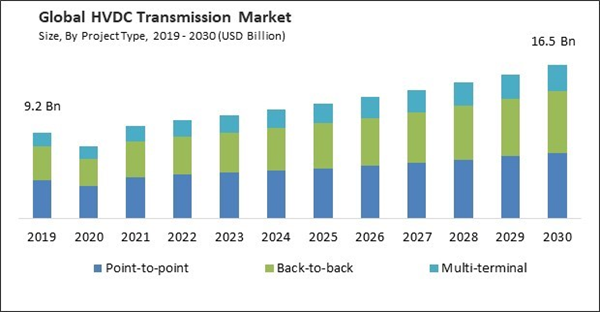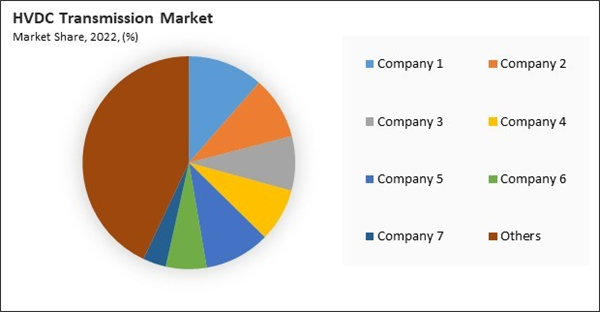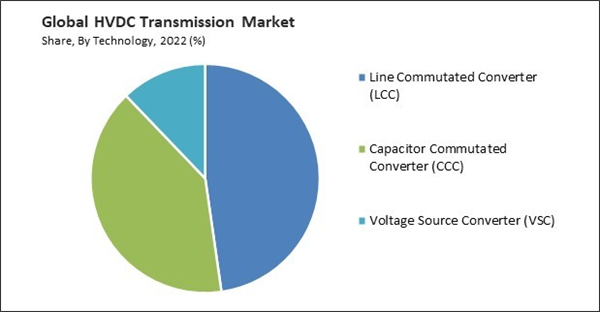Monopolar transmission systems are a HVDC transmission system used for efficient long-distance electricity transmission. In monopolar systems, one conductor, often a high-voltage DC cable or overhead line, transmits electric power. Therefore, the monopolar transmission systems segment will capture 3/4th share in the market by 2030. These systems are simpler in design and construction, making them suitable for certain applications without complexity. Monopolar transmission systems have a single conductor for transmitting and returning the electric current. Some of the factors impacting the market are shift towards renewable energy, technological advancements related to HVDC transmission and availability of distributed and off-grid power generation.
The shift towards renewable energy has played a significant role in driving the growth of the market. This trend has been fueled by several factors highlighting the importance of HVDC technology in integrating renewable energy sources into the electrical grid. Many renewable energy sources, such as wind and solar farms, are located in remote or offshore areas where the energy is generated most efficiently. It allows for the efficient and long-distance transport of electricity from these remote locations to urban centers and regions with high energy demand. Additionally, Innovations in HVDC technology have made it more efficient, flexible, and reliable, leading to its increased adoption in various applications. One of the most significant technological advancements is the development and widespread adoption of VSC-based HVDC systems. VSCs offer enhanced controllability and flexibility, allowing for rapid power flow and grid stability adjustments. As a result, the market has experienced significant growth.
However, distributed power generation can reduce the need for long-distance electricity transmission since it generates electricity closer to where it is consumed. As a result, there may be less demand for large-scale projects designed to transmit power over extensive distances. Integrating distributed and off-grid power sources into the existing electrical grid can be complex. Managing variable renewable energy sources like rooftop solar panels and small wind turbines may require advanced grid management solutions, which can affect the necessity for large-scale HVDC projects.
The leading players in the market are competing with diverse innovative offerings to remain competitive in the market. The above illustration shows the percentage of revenue shared by some of the leading companies in the market. The leading players of the market are adopting various strategies in order to cater demand coming from the different industries. The key developmental strategies in the market are Acquisitions, and Partnerships & Collaborations.
Point-to-Point Outlook
Under point-to-point, the market is further divided into monopolar transmission systems and bipolar transmission systems. The bipolar transmission systems segment covered a considerable revenue share in the market in 2022. Bipolar transmission systems are a type of HVDC transmission system used for efficient and controlled long-distance electricity transmission. In bipolar systems, two conductors transmit electric power, one for transmitting current and the other for returning it. Bipolar HVDC systems offer various advantages and applications compared to monopolar systems, which use a single conductor for transmission.Technology Outlook
Based on technology, the market is categorized into capacitor commutated converter (CCC), voltage source converter (VSC), and line commutated converter (LCC). In 2022, the line commutated converter (LCC) segment witnessed the largest revenue share in the market. A LCC is a power electronic device in these systems. LCC-based HVDC systems are known for their robustness and high voltage capacity, making them suitable for long-distance power transmission. They are commonly used in applications requiring large power transmission, such as transmitting electricity from remote power generation sources, interconnecting grids, or supporting bulk power transmission over extended distances.Project Type Outlook
By project type, the market is fragmented into point-to-point, back-to-back, and multi-terminal. The back-to-back segment garnered a significant revenue share in the market in 2022. Back-to-back HVDC transmission is a specialized form of HVDC technology used to spatially connect two electrical grids or systems very close to each other. Unlike traditional point-to-point HVDC transmission, which connects two physically distant locations, back-to-back HVDC transmission links two areas nearby. Back-to-back HVDC transmission is typically employed when two electrical grids, power systems, or substations are located near each other, often within the same geographical area or city.Application Outlook
On the basis of application, the market is classified into bulk power transmission, interconnecting grids, and infeed urban areas. The interconnecting grids segment recorded a remarkable revenue share in the market in 2022. Interconnecting grids, also known as grid interconnection or grid integration, refers to connecting multiple electrical grids or power systems to enable the exchange of electricity between them. This practice has several benefits, including improving grid reliability, increasing energy security, facilitating the integration of renewable energy sources, and enabling efficient use of resources. Grid interconnection can occur across international borders, allowing neighboring countries to share electricity resources.Component Outlook
On the basis of component, the market is segmented into converter stations, transmission cables, and others. In 2022, the converter stations segment dominated the market with the maximum revenue share. Converter stations are critical to these systems. They are pivotal in converting electrical power between AC and DC, enabling electricity-efficient and long-distance transmission. Converter stations contain semiconductor devices called thyristors or insulated gate bipolar transistors (IGBTs) that act as switches to convert AC power to DC or vice versa. These converter valves are the heart of the converter station, and their performance affects the efficiency and reliability of the HVDC system.Regional Outlook
Based on region, the market is segmented into North America, Europe, Asia Pacific, and LAMEA. In 2022, the Asia Pacific region generated the highest revenue share in the market. A growing number of transmission projects in emerging nations, a favourable regulatory framework for developing and selling HVDC components, and a rising number of rural electrification projects are among the essential aspects driving market growth in the Asia Pacific. In addition, the region's rapidly growing population, urbanization, and a resulting rise in electricity demand are significant factors driving market expansion.The market research report covers the analysis of key stake holders of the market. Key companies profiled in the report include Hitachi, Ltd., Mitsubishi Electric Corporation, Siemens Energy AG, General Electric Company, Prysmian Group, Toshiba Corporation, NKT Photonics A/S (NKT A/S), Nexans S.A., LS ELECTRIC CO., Ltd, and NR Electric Co., Ltd. (NARI Technology Development Limited Co.)
Scope of the Study
Market Segments Covered in the Report:
By Project Type- Point-to-point
- Monopolar Transmission Systems
- Bipolar Transmission Systems
- Back-to-back
- Multi-terminal
- Line Commutated Converter (LCC)
- Capacitor Commutated Converter (CCC)
- Voltage Source Converter (VSC)
- Bulk Power Transmission
- Interconnecting Grids
- Infeed Urban Areas
- Converter Stations
- Transmission Cables
- Others
- North America
- US
- Canada
- Mexico
- Rest of North America- Europe
- Germany
- UK
- France
- Russia
- Spain
- Italy
- Rest of Europe- Asia Pacific
- China
- Japan
- India
- South Korea
- Singapore
- Malaysia
- Rest of Asia Pacific- LAMEA
- Brazil
- Argentina
- UAE
- Saudi Arabia
- South Africa
- Nigeria
- Rest of LAMEA
Key Market Players
List of Companies Profiled in the Report:
- Hitachi, Ltd.
- Mitsubishi Electric Corporation
- Siemens Energy AG
- General Electric Company
- Prysmian Group
- Toshiba Corporation
- NKT Photonics A/S (NKT A/S)
- Nexans S.A.
- LS ELECTRIC CO., Ltd
- NR Electric Co., Ltd. (NARI Technology Development Limited Co.)
Unique Offerings
- Exhaustive coverage
- The highest number of Market tables and figures
- Subscription-based model available
- Guaranteed best price
- Assured post sales research support with 10% customization free
Table of Contents
Companies Mentioned
- Hitachi, Ltd.
- Mitsubishi Electric Corporation
- Siemens Energy AG
- General Electric Company
- Prysmian Group
- Toshiba Corporation
- NKT Photonics A/S (NKT A/S)
- Nexans S.A.
- LS ELECTRIC CO., Ltd
- NR Electric Co., Ltd. (NARI Technology Development Limited Co.)











